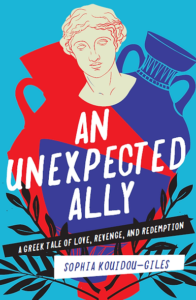Follow the thread of the Fates in this fast-paced and adventurous new tale of love and revenge from the world of Circe as she finds herself caught in the middle of a romance filled with tragedy. An Unexpected Ally by Sophia Kouidou-Giles (She Writes Press, Oct 3, 2023), follows Circe to Delos where she meets the amphibian-god Glaucus. But Glaucus is in love with the unattainable beauty Skylla. After Circe speaks with Skylla about Glaucus, she finds that Skylla is in love with a mortal man and decides that it’s better to leave this weary relationship to the two of them. Unfortunately for Skylla, Glaucus’s jealousy enrages turning her into a six-headed monster with twelve legs. It’s now up to Circe to return to Delos to save her new friend from her awful fate. Trust me, this story of Circe is the feminist myth retelling we’ve all been waiting for!

Sophia talks about the enduring power of greek myth in her compelling guest article…
The magic of Greek mythology has captivated readers through the ages. Ancient and yet modern these stories have appeared and reappeared in world literature. They are expressions of the collective voice, of folk wisdom, flexible and adaptable.
In their day, myths offered a way of communicating culture, reflecting issues of the time, alive and interacting with living and ephemeral cultures. The exaggerated characters and often violent stories carry messages reflecting frightening aspects of our human nature. What is exciting for today’s reader is the freshness and current relevance for they appear in different contexts and depict familiar paradigms of living. Furthermore, myths do not confine their presence to literature alone. We encounter them in paintings and museums, in movie theaters, and many electronic games that have overtaken young and old today. Screens, bookstores, libraries and museums are populated with the evidence. It is because they continue to inspire new art, as creatives rework and reinvent them.
Mythology offers a multitude of well-drawn characters, mortal, and immortal. Information about each is wrapped in just their names: Zeus, Prometheus, Circe; Agamemnon, Medea, Achilles. And therein lies the beauty of this theater of life. Authors often follow the tracks of traditional myths and conjure up contrasts, new complexities, and reversals to engage readers.
In Greek mythology, gods have superpowers and assigned kingdoms (Zeus, Father of all gods and ruler of the sky; Hera, goddess of women, marriage, family and childbirth; Aphrodite, goddess of sexual love and beauty; Aris, god of war and the spirit of battle; Poseidon, god of the sea), and meddle with human lives. They are immortal, can shape-shift, possess powerful weapons (i.e. Zeus thunderbolt), become invisible, and more. Mortals come with gifts, baggage, and dilemmas to resolve. Ancient myths have been hovering through the ages, capricious, ready to engage and appear in modern literature because they resonate in today’s world, depicting love, hate, competition, revenge and so much more.
There is world creation in the hands of fiction authors, endowed with magic super-powers and high drama. In sculpting the plot, Hades may be a good resting place and Venus may turn out to be ugly for the sake of irony and revenge. Intention matters. It is satisfying to find the flexibility in reinterpreting characters, drawing out elements to form stories, creating novel variations.
The relationship between myth and history is that each period deals with prevailing issues that describe and challenge it. That context is bound to influence the interpretation of a myth in the hands of storytellers. That is what keeps myths flexible, appearing in reimagined worlds. We have been there before and the world is still evolving, changing and challenging the imagination.
We can find ancient Greek myths almost anywhere we turn. While many of the myths were first written down by Homer in the Iliad and Odyssey, they actually predate his telling of them. The myths were part of an oral tradition that was passed down from generation to generation before finally being written down. Also, let’s not forget that some myths have already been endowed with many lives, for I am not the only one charmed, as I encountered them in various iterations. Take Circe for example. She has had a long literary life, inspiring authors such as Ovid, James Joyce, Eudora Welty, Margaret Atwood, and most recently, Madeline Miller.
In Roman Ovid’s Metamorphosis, Circe is a villain, the wicked, vengeful witch that refuses to help Glaucus and transforms mortals into animals. James Joyce, the well-known Irish author, in his Ulysses portrays Circe in the character of Bella Cohen, her double, and she is cast as the madam of a Brothel in Dublin. There is a strong suggestion that she had supernatural powers. Is this a case of art imitating life or is it the other way around? It is interesting to note that in Homer’s Odyssey, Circe turns Odysseus’ men into animals but in Joyce’s retelling, it is Bella Cohen who turns her clients into beasts.
The American author, Eudora Welty, in her short story, Circe, depicts her protagonist during her yearlong love affair with Odysseus, highlighting her domestic skills, assigning her a sharp and funny personality. Odysseus leaves her pregnant with a son fated to kill his father. In her Circe: Mud Poems, Canadian author, Margaret Atwood, in the persona of Circe, observes the King of Ithaca and their relationship in the context of Trojan death and destruction, a desert of bones and limbs and his thirst for power, in a lengthy series of tragic prose poems. Atwood’s work is not a retelling of the myths, rather it is an exploration of the nature of power and its seductive and destructive aspects as seen through the lens of one of its most well-known practitioners. American author, Madeline Miller in her lyrical novel, Circe, conjures up the life of a powerful and misunderstood goddess, flawed, evil, yet relatable as she blends her days with several known ancient Greek gods and mortals. Most recently, Circe is the protagonist in my novel, An Unexpected Ally: A Greek Tale of Love, Revenge and Redemption.
Myths provide a perfect foundation–a wide berth to delve into fundamental questions, morals and goodness, power and evil, vengeance and friendship. Some myths work out our need to undo wrongs and explore the moral and ethical lessons that resonate with readers today. Greek myths were never intended as historical fact, but rather as a way of explaining the natural world and human behavior. They are fascinating stories about gods, heroes, and monsters that teach us about important universal truths. Homer’s Iliad and Odyssey describes stories about families, cities, leaders of his time, wars and relationships that embody societal codes we recognize. I am partial to the messy Greek pantheon and ancient folklore while I recognize that mythology lives in many traditions around the globe, to name a few, Celtic and Norse, Chinese and Native American. Still relevant today, they offer a way of understanding the human condition and provide insight into our own lives and experiences.
CLICK HERE FOR BOOK CLUB QUESTIONS
 Sophia Kouidou-Giles was born in Thessaloniki, Greece and is university educated in the USA. She holds a Bachelors in Psychology and a Masters in Social Work. In her 34 year child welfare career, she served as a practitioner, educator, researcher, and administrator publishing articles in Greek and English professional journals with a focus on child welfare services. In recent years, her focus shifted to writing non-fiction and poetry, and she will be publishing her first fiction novel An Unexpected Ally in October. She lives in Seattle near her son, her daughter-in-law and two grandsons.
Sophia Kouidou-Giles was born in Thessaloniki, Greece and is university educated in the USA. She holds a Bachelors in Psychology and a Masters in Social Work. In her 34 year child welfare career, she served as a practitioner, educator, researcher, and administrator publishing articles in Greek and English professional journals with a focus on child welfare services. In recent years, her focus shifted to writing non-fiction and poetry, and she will be publishing her first fiction novel An Unexpected Ally in October. She lives in Seattle near her son, her daughter-in-law and two grandsons.



To get a bonus of 150$, make any exchange in the Zeus Exchange using Promo code “CODE-2023-GO08”